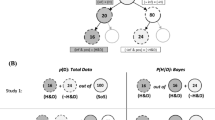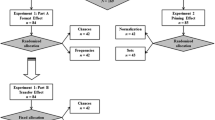Summary
In this series of experiments the effects of phrasing Wason's THOG problem in realistic terms were investigated. Experiments 1 and 2 used realistic materials of very different kinds, but neither version of the problem produced any facilitation compared with the original abstract version. Experiment 3 used a version of the problem in which the correct answer was cued in by the realistic material, and a significant improvement was found. Experiment 4 used a version of the problem similar to that used in Experiment 3 and again improved performance was found; since the subjects in this experiment were eight- and nine-year-old children, the facilitation almost certainly was not the result of improved logical ability. The results of Experiment 5, however, suggested that it was difficult to cue in adults to give the logically incorrect answer. It is concluded that realism improves performance on this problem only when the realistic material cues in the correct answer from memory. A review of the research that makes use of other reasoning paradigms suggests that this conclusion may hold true for these as well.
Similar content being viewed by others
References
Brown C, Keats JA, Keats DM, Seggie I (1980) Reasoning about implication: A comparison of Malaysian and Australian subjects. J Cross-Cult Psychol 11:395–410
Cordell RL (1978) Mature reasoning and problem solving. Unpublished University of Nottingham M Ed dissertation
Evans JStBT (1982) The psychology of deductive reasoning. Routledge Kegan Paul, London
Golding E (1981) The effect of past experience on problem solving. Paper presented at the British Psychological Society Annual Conference, The University of Surrey
Griggs RA, Cox JR (1982) The elusive thematic-materials effect in Wason's selection task. Brit J Psychol (in press)
Griggs RA, Newstead SE (1982) The role of problem structure in a deductive reasoning task. J Exp Psychol: Learning, Memory and Cognition (in press)
Henle M (1962) On the relation between logic and thinking. Psychol Rev 69:366–378
Inhelder B, Piaget J (1958) The growth of logical thinking from childhood to adolescence. Basic Books, New York
Janis IL, Frick F (1943) The relationship between attitudes towards conclusions and errors in judging logical validity of syllogisms. J Exp Psychol 33:73–77
Johnson-Laird PN, Legrenzi P, Sonino Legrenzi M (1972) Reasoning and a sense of reality. Brit J Psychol 63:395–400
Kaufman H, Goldstein S (1967) The effects of emotional value of conclusions upon distortions in syllogistic reasoning. Psychono Sci 7:367–368
Lefford A (1946) The influence of emotional subject matter on logical reasoning. J Gen Psychol 34:127–151
Manktelow KI, Evans JSBT (1979) Facilitation of reasoning by realism: Effect or non-effect? Brit J Psychol 70:477–488
Morgan J, Morton J (1944) The distortion of syllogistic reasoning produced by personal convictions. J Soc Psychol 20:35–59
Piaget J (1972) Intellectual evolution from adolescence to adulthood. Hum Dev 15:1–12
Roberge JJ (1977) Effects of content on inclusive disjunction reasoning. Q J Exp Psychol 29:669–676
Roberge JJ (1978) Linguistic and psychometric factors in propositional reasoning. Q J Exp Psychol 30:705–716
Roberge JJ, Antonak RF (1979) Effects of familarity with content on propositional reasoning. J Gen Psychol 100:35–41
Roberge JJ, Paulus DH (1971) Developmental patterns for children's class and conditional reasoning abilities. Dev Psychol 4:191–200
Van Duyne PC (1974) Realism and linguistic complexity in reasoning. Brit J Psychol 65:59–67
Yachanin SA (1980) Differential effects of thematic materials and order of rule presentation on a reasoning task. Unpublished Master's thesis, Bowling Green State University, Bowling Green, Ohio, USA
Wason PC (1966) Reasoning. In: Foss B (ed) New horizons in psychology. Penguin, London
Wason PC (1968) Reasoning about a rule. Q J Exp Psychol 20:273–281
Wason PC (1977) Self-contradictions. In: Johnson-Laird PN, Wason PC (eds) Thinking: Readings in cognitive science. Cambridge University Press, Cambridge
Wason PC (1978) Hypothesis testing and reasoning. Unit 25, Block 4, Cognitive psychology. Open University Press, Milton Keynes
Wason PC, Brooks PG (1979) THOG: The anatomy of a problem. Psychol Res 41:79–90
Wason PC, Shapiro D (1971) Natural and contrived experience in a reasoning problem. Q J Exp Psychol 23:63–71
Wilkins MC (1928) The effect of changed material on the ability to do formal syllogistic reasoning. Arch Psychol 16:No 102
Author information
Authors and Affiliations
Rights and permissions
About this article
Cite this article
Newstead, S.E., Griggs, R.A. & Warner, S.A. The effects of realism on Wason's THOG problem. Psychol. Res 44, 85–96 (1982). https://doi.org/10.1007/BF00308558
Received:
Issue Date:
DOI: https://doi.org/10.1007/BF00308558




